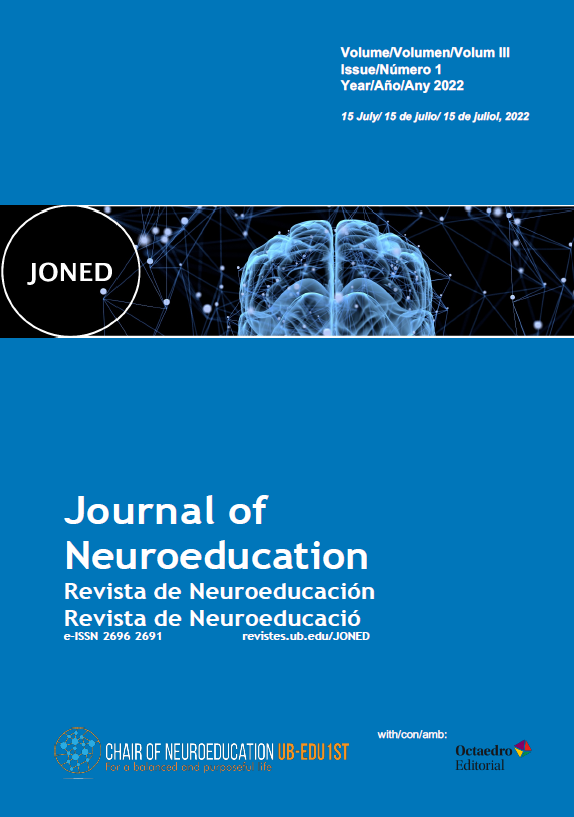What do we mean by metacognition inside the classroom?
Keywords:
metacognición, aprendizaje autorregulado, monitoreo y control, enseñanza, educaciónDownloads
References
Flavell JH. Metacognitive Aspects of Problem Solving. In: Resnick , L. B., editors. The Nature of Intelligence; Erlbaum. 1976: 231-236.
Flavell JH. Metacognition and cognitive monitoring: A new area of cognitive-developmental inquiry. American Psychologist. 1979;34(10):906–11. Available from: http://content.apa.org/journals/amp/34/10/906
O’reilly F, Chande R, Groot B, Sanders M, Soon Z. Behavioural Insights for Education A practical guide for parents, teachers and school leaders. London; 2017.
Salles A, Ais J, Semelman M, Sigman M, Calero CI. The metacognitive abilities of children and adults. Cognitive Development. 2016;40:101–10.
Nelson TO, Narens L. Metamemory: A Theoretical Framework and New Findings. Psychology of Learning and Motivation - Advances in Research and Theory. 1990;26(C):125–73.
Flavell JH. Development of children’s knowledge about the mental world. International Journal of Behavioral Development. 2000;24(1):15–23. Available from: http://www.tandf.co.uk/journals/pp/01650254.html
Lyons KE, Ghetti S. The Development of Uncertainty Monitoring in Early Childhood. Child Development. 2011;82(6):1778–87.
Coughlin C, Hembacher E, Lyons KE, Ghetti S. Introspection on uncertainty and judicious help-seeking during the preschool years. Developmental Science. 2015;18(6):957–71.
Ghetti S, Hembacher E, Coughlin CA. Feeling uncertain and acting on it during the preschool years: A metacognitive approach. Child Development Perspectives. 2013;7(3):160–5.
Roebers CM. Executive function and metacognition: Towards a unifying framework of cognitive self-regulation. Vol. 45, Developmental Review. Mosby Inc.; 2017. p. 31–51.
Schneider W. The development of metacognitive knowledge in children and adolescents: Major trends and implications for education. Vol. 2, Mind, Brain, and Education. 2008. p. 114–21.
Lai ER. Metacognition: A Literature Review Research Report. Always learning: Pearson Research Report. 2011. Available from: http://www.pearsonassessments.com/research.
Son LK, Kornell N. The virtues of ignorance. Vol. 83, Behavioural Processes. 2010. p. 207–12.
Hacker DJ, Bol L, Horgan DD, Rakow EA. Test prediction and performance in a classroom context. Journal of Educational Psychology. 2000;92(1):160–70.
Sinkavich F. Performance and metamemory - Do students know what they don′t know? Journal of Instructional Psychology. 1995;22(1):77–87.
Dunlosky J, Rawson KA. Overconfidence produces underachievement: Inaccurate self evaluations undermine students’ learning and retention. Learning and Instruction. 2012;22(4):271–80.
Metcalfe J, Kornell N. Principles of cognitive science in education: The effects of generation, errors, and feedback. Psychonomic Bulletin & Review. 2007;14(2):225–9. Available from: http://link.springer.com/10.3758/BF03194056
Schneider W, Visé M, Lockl K, Nelson TO. Developmental trends in children’s memory monitoring: Evidence from a judgment-of-learning task. Cognitive Development. 2000;15(2):115–34. Available from: https://linkinghub.elsevier.com/retrieve/pii/S0885201400000241
Schneider W, Lockl K. Procedural metacognition in children: Evidence for developmental trends. In: Handbook of Metamemory and Memory. 2013.
Metcalfe J, Kornell N. Principles of cognitive science in education: The effects of generation, errors, and feedback. Psychonomic Bulletin & Review. 2007;14(2):225–9. Available from: http://link.springer.com/10.3758/BF03194056
Kornell N, Son LK. Learners’ choices and beliefs about self-testing. Memory. 2009;17(5):493–501.
Carroll M. Metacognition in the classroom. In: Dunlosky J, Bjork RA, editors. Handbook of Metamemory and Memory. Psychology Press; 2013. p. 411–27.
Destan N, Roebers CM. What are the metacognitive costs of young children’s overconfidence? Metacognition and Learning. 2015;10(3):347–74.
Bransford J, Sherwood R, Vye N, Rieser J. Teaching thinking and problem solving: Research foundations. American Psychologist. 1986;41(10):1078–89. Available from: http://doi.apa.org/getdoi.cfm?doi=10.1037/0003-066X.41.10.1078
Schneider W, Pressley Michael. Memory Development Between Two and Twenty. 2nd ed. New York, NY: Psychology Press; 1997. Available from: https://www.taylorfrancis.com/books/9781134802623
Dawson TL. Metacognition and learning in adulthood. 2008.
Education Endowment Foundation. Metacognition and self-regulation. London; 2021 [cited 2021 Oct 25]. Available from: https://educationendowmentfoundation.org.uk/education-evidence/teaching-learning-toolkit/metacognition-and-self-regulation
Boekaerts M. Self-regulated Learning at the Junction of Cognition and Motivation. European Psychologist. 1996;1(2):100–12.
Lockl K, Schneider W. Developmental trends in children’s feeling-of-knowing judgements. International Journal of Behavioral Development. 2002;26(4):327–33.
Schraw G. Promoting general metacognitive awareness. Instructional Science. 1998;26(1–2):113–25.
Simpson ML, Nist SL. An update on Strategic Learning: It’s More than Textbook Reading Strategies. Vol. 43, Source: Journal of Adolescent & Adult Literacy. 2000.
Vandevelde S, van Keer H, Schellings G, van Hout-Wolters B. Using think-aloud protocol analysis to gain in-depth insights into upper primary school children’s self-regulated learning. Learning and Individual Differences. 2015;43:11–30.
Whitebread D, Coltman P, Pasternak DP, Sangster C, Grau V, Bingham S, et al. The development of two observational tools for assessing metacognition and self-regulated learning in young children. Metacognition and Learning. 2009;4(1):63–85.
Quigley, A., Mujis, D., Stringer E. Metacognition and self-regulated learning. Guidance Report. London; 2018.
Downloads
Published
Issue
Section
License
Copyright (c) 2022 Julieta Goldstein, Cecilia Inés Calero

This work is licensed under a Creative Commons Attribution-NonCommercial 4.0 International License.
The authors who publish in this journal agree to the following terms:
a. Authors retain copyright and grant the journal the right of first publication
b. Texts will be published under a Creative Commons Attribution Non Commercial License that allows others to share the work, provided they include an acknowledgement of the work’s authorship, its initial publication in this journal and the terms of the license, and not for commercial use.



